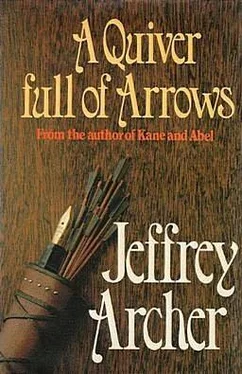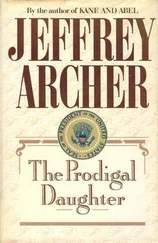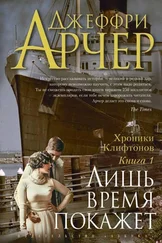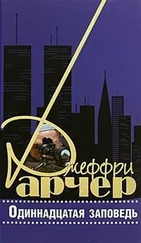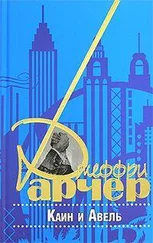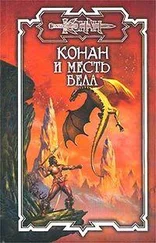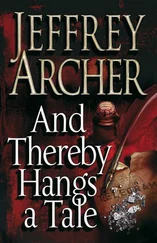“A rather dull Schools year for me,” said William, “but I still managed five firsts from a field of eleven.”
“An even duller one for me,” said Philippa, “but somehow I squeezed three firsts out of six, and you won’t have to invoke the binomial theorem, William, to work out that it’s an arithmetical victory for me.”
“The chairman of the examiners tells me,” said William, “that a greater part of what your pupils say is no more than a recitation from memory.”
“He told me,” she retorted, “that yours have to make it up as they go along.”
When they dined together in college the guest list was always quickly filled, and as soon as grace had been said, the sharpness of their dialogue would flash across the candelabra.
“I hear a rumor, Philippa, that the college doesn’t feel able to renew your fellowship at the end of the year?”
“I fear you speak the truth, William,” she replied. “They decided they couldn’t renew mine at the same time as offering me yours.”
“Do you think they will ever make you a Fellow of the British Academy, William?”
“I must say, with some considerable disappointment, never.”
“I am sorry to hear that; why not?”
“Because when they did invite me, I informed the President that I would prefer to wait to be elected at the same time as my wife.”
Some non-University guests sitting in high table for the first time took their verbal battles seriously; others could only be envious of such love.
One Fellow uncharitably suggested they rehearsed their lines before coming to dinner for fear it might be thought they were getting on well together. During their early years as young dons, they became acknowledged as the leaders in their respective fields. Like magnets, they attracted the brightest undergraduates while apparently remaining poles apart themselves.
“Dr. Hatchard will be delivering half these lectures,” Philippa announced at the start of the Michaelmas Term of their joint lecture course on Arthurian legend. “But I can assure you it will not be the better half. You would be wise always to check which Dr. Hatchard is lecturing.”
When Philippa was invited to give a series of lectures at Yale, William took a sabbatical so that he could be with her.
On the ship crossing the Atlantic, Philippa said, “Let’s at least be thankful the journey is by sea, my dear, so we can’t run out of petrol.”
“Rather let us thank God,” replied William, “that the ship has an engine because you would even take the wind out of Cunard’s sails.”
The only sadness in their lives was that Philippa could bear William no children, but if anything it drew the two closer together. Philippa lavished quasi-maternal affection on her tutorial pupils and allowed herself only the wry comment that she was spared the probability of producing a child with William’s looks and William’s brains.
At the outbreak of war William’s expertise with handling words made a move into cipher-breaking inevitable. He was recruited by an anonymous gentleman who visited them at home with a briefcase chained to his wrist. Philippa listened shamelessly at the keyhole while they discussed the problems they had come up against and burst into the room and demanded to be recruited as well.
“Do you realize that I can complete The Times crossword puzzle in half the time my husband can?”
The anonymous man was only thankful that he wasn’t chained to Philippa. He drafted them both to the Admiralty section to deal with enciphered wireless messages to and from German submarines.
The German signal manual was a four-letter code book and each message was reciphered, the substitution table changing daily. William taught Philippa how to evaluate letter frequencies and she applied her new knowledge to modern German texts, coming up with a frequency analysis that was soon used by every code-breaking department in the Commonwealth.
Even so, breaking the ciphers and building up the master signal book was a colossal task which took them the best part of two years.
“I never knew your ifs and ands could be so informative,” she said admiringly of her own work.
When the allies invaded Europe, husband and wife could together often break ciphers with no more than half a dozen lines of encoded text to go on.
“They’re an illiterate lot,” grumbled William. “They don’t encipher their umlauts. They deserve to be misunderstood.”
“How can you give an opinion when you never dot your i’s, William?”
“Because I consider the dot is redundant and I hope to be responsible for removing it from the English language.”
“Is that to be your major contribution to scholarship, William? If so, I am bound to ask how anyone reading the work of most of our undergraduates’ essays would be able to tell the difference between an I and an i.”
“A feeble argument, my dear, that if it had any conviction would demand that you put a dot on top of an n so as to be sure it wasn’t mistaken for an h.”
“Keep working away at your theories, William, because I intend to spend my energy removing more than the dot and the 1 from Hitler.”
In May 1945 they dined privately with the Prime Minister and Mrs. Churchill at Number Ten Downing Street.
“What did the Prime Minister mean when he said to me he could never understand what you were up to?” asked Philippa in the taxi to Paddington Station.
“The same as when he said to me he knew exactly what you were capable of, I suppose,” said William.
When the Merton Professor of English retired in the early nineteen-fifties the whole University waited to see which Dr. Hatchard would be appointed to the chair.
“If Council invite you to take the chair,” said William, putting his hand through his graying hair, “it will be because they are going to make me Vice-Chancellor.”
“The only way you could ever be invited to hold a position so far beyond your ability would be nepotism, which would mean I was already Vice-Chancellor.”
The General Board, after several hours’ discussion of the problem, offered two chairs and appointed William and Philippa full professors on the same day.
When the Vice-Chancellor was asked why precedent had been broken he replied: “Simple; if I hadn’t given them both a chair, one of them would have been after my job.”
That night, after a celebration dinner when they were walking home together along the banks of the Isis across Christ Church Meadows, in the midst of a particularly heated argument about the quality of the last volume of Proust’s monumental works, a policeman, noticing the affray, ran over to them and asked:
“Is everything all right, madam?”
“No, it is not,” William interjected. “This woman has been attacking me for thirty years and to date the police have done deplorably little to protect me.”
In the late fifties Harold Macmillan invited Philippa to join the board of the IBA.
“I suppose you’ll become what’s known as a telly don,” said William, “and as the average mental age of those who watch the box is seven you should feel quite at home.”
“Agreed,” said Philippa. “Over twenty years of living with you has made me fully qualified to deal with infants.”
The chairman of the BBC wrote to William a few weeks later inviting him to join the Board of Governors.
“Are you to replace ‘Hancock’s Half Hour’ or ‘Dick Barton, Special Agent’?” Philippa inquired.
“I am to give a series of twelve lectures.”
“On what subject, pray?”
“Genius.”
Philippa flicked through the Radio Times . “I see that ‘Genius’ is to be viewed at two o’clock on a Sunday morning, which is understandable, as it’s when you are at your most brilliant.”
Читать дальше
